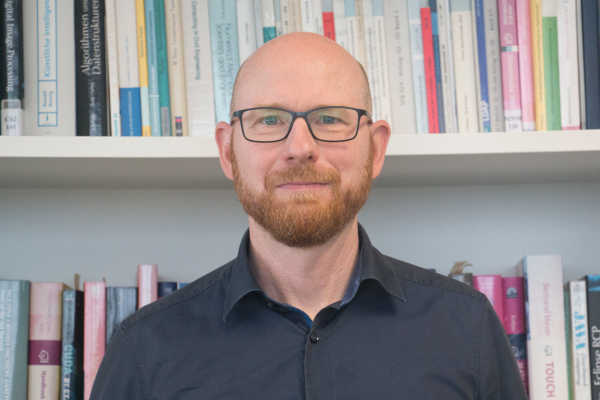26.10.2021

The "BIM Entwicklung" campaign has recently been published. In the e-paper, Prof. Dr.-Ing. Markus König reports on the potential of construction informatics, the shortage of skilled workers in this field and what challenges the foreseeable future holds.
The construction industry needs professionals with a solid competence in the field of digital work practices. The Faculty of Civil and Environmental Engineering at Ruhr-Universität Bochum offers a broad and well-founded education and is also working on opportunities for specialization. Recently, therefore, the master's specialization "Digital Design and Construction" was launched in Bochum. However, further training opportunities are also important, as every specialist planner will need to have a basic knowledge of digitalization in the future in order to keep pace with digital progress in the construction industry.
Improvements in the area of BIM use should also lie in exploiting current opportunities, but this also requires changes in the framework conditions. One example of this is the widespread use of BIM models for building applications. The first BIM-based building permit from 2020 represents a success in this area. In the long term, however, the model or state building code would have to be revised and binding specifications created.
In the use of BIM, AI processes also provide considerable potential. Among other things, this opens up new possibilities in the modeling of existing buildings. The digitization of existing buildings currently still requires a great deal of time and manpower due to the fact that data must be extracted from photos, paper documents and 2D plans. AI processes are intended to remedy this situation. The AI should generate an inventory model on the basis of the analog documents - as automatically as possible. Our BIMKIT project, for example, is also working on this. The initial results look promising, so we can look forward to the future with anticipation.
E-paper to read (more...)
Markus König, Prof. Dr.-Ing. (more...)
The "BIM Entwicklung" campaign has recently been published. In the e-paper, Prof. Dr.-Ing. Markus König reports on the potential of construction informatics, the shortage of skilled workers in this field and what challenges the foreseeable future holds.
The construction industry needs professionals with a solid competence in the field of digital work practices. The Faculty of Civil and Environmental Engineering at Ruhr-Universität Bochum offers a broad and well-founded education and is also working on opportunities for specialization. Recently, therefore, the master's specialization "Digital Design and Construction" was launched in Bochum. However, further training opportunities are also important, as every specialist planner will need to have a basic knowledge of digitalization in the future in order to keep pace with digital progress in the construction industry.
Improvements in the area of BIM use should also lie in exploiting current opportunities, but this also requires changes in the framework conditions. One example of this is the widespread use of BIM models for building applications. The first BIM-based building permit from 2020 represents a success in this area. In the long term, however, the model or state building code would have to be revised and binding specifications created.
In the use of BIM, AI processes also provide considerable potential. Among other things, this opens up new possibilities in the modeling of existing buildings. The digitization of existing buildings currently still requires a great deal of time and manpower due to the fact that data must be extracted from photos, paper documents and 2D plans. AI processes are intended to remedy this situation. The AI should generate an inventory model on the basis of the analog documents - as automatically as possible. Our BIMKIT project, for example, is also working on this. The initial results look promising, so we can look forward to the future with anticipation.
E-paper to read (more...)
Markus König, Prof. Dr.-Ing. (more...)